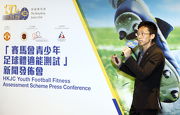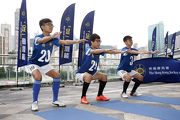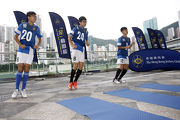The Hong Kong Jockey Club today (12 May) revealed the latest research findings from the second Jockey Club Youth Football Fitness Assessment. These findings include the pilot run of a High Intensity Circuit Training programme in local secondary schools, which was found to be highly effective in improving the fitness of students within a short period of time. The Hong Kong Jockey Club Sports Medicine and Health Sciences Centre of the Chinese University of Hong Kong, which was responsible for the study, hopes to further promote this simple yet effective training programme in a bid to improve the fitness level of local young football players.
The Club’s Chief Executive Officer Winfried Engelbrecht-Bresges told guests at the press conference that over 530 young footballers have taken part in the JC Youth Football Fitness Assessment since it started two years ago. “Our aim was to profile the fitness levels of Hong Kong’s young footballers, and then use that data to develop a tailor-made fitness training programme. All of this is following best practice in international football clubs and training academies,” he explained.
The JC Youth Football Fitness Assessment is a joint initiative by the Club, the Hong Kong Football Association, the Hong Kong Jockey Club Sports Medicine and Health Sciences Centre of the Chinese University of Hong Kong and Manchester United, with the support of the Hong Kong Sports Institute as technical consultant. The assessments test the football-specific competences of explosiveness, speed, agility and endurance of the local young players - these being the competences required by professional players. The city’s first youth football database has been set up based on the programme findings.
About 100 young football players who took part in the first JC Youth Football Fitness Assessment were invited to undergo the same assessments again this year so as to identify any changes in their fitness level. The study revealed that in terms of speed and endurance the eldest group of participants aged 16-17 made a less significant improvement relative to younger players. This group of students also regressed in terms of agility. Experts from the Hong Kong Jockey Club Sports Medicine and the Health Sciences Centre of the Chinese University of Hong Kong, who were in charge of the project, explained that the performance of this older group was associated with a lack of regular fitness training. On average, Hong Kong footballers practise 1.5 times a week as compared to the 4-5 times a week which is the average of Western players.
The Club has also explored ways of increasing the effectiveness of fitness training in Hong Kong. In this respect it is understood that while increasing the volume of field training could be challenging, increasing the volume and efficiency of physical training is achievable. To test this, the Club carried out a pilot run of a High Intensity Circuit Training programme in secondary schools. The training circuit consisted of a series of 18 exercises, carried out in three stages over a seven week period. At the end of the seven weeks, researchers found that the young footballers had made a significant improvement, including a 14% increase in their core muscle strength and endurance, a 6% increase in their agility and a 5% decrease in their body fat.
The researchers explained that this training programme can be conducted in quite small spaces, making it highly applicable to the Hong Kong environment. Indeed, it is anticipated that the programme can not only help young local players realise their footballing potential but can also be of benefit to other young people in the community.
For detailed findings of the Youth Football Fitness Assessment and the High Intensity Circuit Training programme, please visit the JC Youth Football Development website at http://campaign.hkjc.com/en/yfd/index.aspx.
The Club has long been committed to youth football development in Hong Kong. Over the past three years, in addition to the JC Youth Football Fitness Assessment, it has worked hand-in-hand with world-renowned Manchester United to launch a series of innovative youth football projects, including the JC Elite Youth Football Camp, the JC School Football Development Scheme, and the JC Youth Football Leadership Scheme. All of these projects are designed to unite overseas and local football training experts, specialists in sports sciences and talent from the community with the objective of inspiring young football players to develop their full potential in terms of their sporting, social and leadership skills.
The Hong Kong Jockey Club
Founded in 1884, The Hong Kong Jockey Club is a world-class horse racing operator and Hong Kong’s largest community benefactor, as well as one of Asia’s most prestigious membership clubs. Operating as a not-for-profit organisation, the Club allocates its surplus funds for charitable and community projects. In 2013/14, its donations reached a record $3.6 billion, and in the last decade alone it supported over 1,275 projects. The Club is also Hong Kong’s largest single taxpayer, contributing a record HK$19.58 billion in 2013/14. With about 70% of its revenue given back to society every year through donations and tax contributions, The Hong Kong Jockey Club delivers a significantly higher return to the community than any other racing and/or sports betting organisation in the world. As a socially responsible organisation, the Club helps Government combat illegal betting and advocates responsible gambling. The Club is also one of Hong Kong’s largest employers with over 24,800 full-time and part-time staff. Committed to global excellence and giving back to society, the Club is always “riding high together for a better future” with the people of Hong Kong. Please visit 130.hkjc.com.
|

The Cluba£á?s Chief Executive Officer Winfried Engelbrecht-Bresges says fitness data collected from the Hong Kong Youth Football Fitness Assessment will be used to develop a tailor-made fitness training programme for young footballers.
|

Project Leader of The Hong Kong Jockey Club Sports Medicine and Health Sciences Centre of the Chinese University of Hong Kong Hardaway Chan Chun-kwan announces study results and key findings.
|
|

The Cluba£á?s Chief Executive Officer Winfried Engelbrecht-Bresges (1st right) presents a souvenir to the teacher and students from the Queen Elizabeth School Old Studentsa£á? Association Secondary School as a token of thanks for their participation in the programme.
|

The Cluba£á?s Chief Executive Officer Winfried Engelbrecht-Bresges (centre); Deputy Director of the HKJC Sports Medicine and Health Sciences Centre of the Chinese University of Hong Kong Dr Patrick Yung (3rd right) and Project Leader Hardaway Chan Chun-kwan(1st right); Technical Director and Head Coach of Hong Kong Representative Team of The Hong Kong Football Association (HKFA) Kim Pan-gon(3rd left); Head of Football Development Paul Woodland (2nd left); Hong Kong Head Coach of Manchester United Soccer School Christopher Oa£á?Brien (2nd right) and the teacher and students from the participating school pose for a photo.
|
|

Photos 5, 6: Students from Queen Elizabeth School Old Studentsa£á? Association Secondary School demonstrate the exercises used in the High Intensity Circuit Training programme. A pilot study shows that the training can help increase the fitness levels of young footballers.
|

|